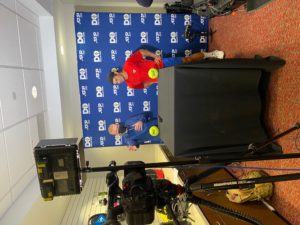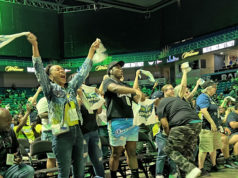In an individual sport like tennis, players’ journeys to its top levels vary as widely as the myriad of countries that produce them. This week, a number of top men’s professionals have traveled to North Texas to compete in the Dallas Open at SMU. Thanks to the recent spate of less-than-typical weather, a few had difficulty making it. Others, like the subject of the video interview in this blog post, Marcos Giron, encountered no issues getting here.
When he took the court Wednesday, however, it was a different story for Giron. He dropped the first set to Liam Broady of Great Britain. But the Californian scrapped back to take the second and third on the way to a 3-6, 6-3, 6-1 second-round win and I spoke to him after the match.
The 28-year-old has followed a steady ascent in the rankings. He broke into the top 100 in the world in August of 2020 and has remained there. He earned a spot on the U.S. Olympic team last summer, winning a match before falling to the homestanding Kei Nishikori. While he’s still seeking his first ATP Tour title, he knows how to win a big tournament. Giron won the 2014 NCAA Singles championship at UCLA.
Not every player takes the college route to the pros, though it’s somewhat common for American men. And with players in general taking advantage of modern conditioning and nutrition knowledge to play at a high level into their 30s, delaying the start of one’s pro career (and its subsequent peak) might not be too big a deal. Giron has boosted his ranking to 70th and if he could manage a win in his next match against first-seeded Taylor Fritz and go deep in the tournament, he’d feel extra good about the direction his career is taking. He’d be pretty glad he made the trip to Texas, where’s he’s already won a Challenger-level doubles title in Dallas and Challenger singles in Houston.
 In the video interview that serves as the centerpiece of this blog post, he explains why he came to the the tournament, how he won the match, the details of his Olympic experience, and why the college route made sense for him.
In the video interview that serves as the centerpiece of this blog post, he explains why he came to the the tournament, how he won the match, the details of his Olympic experience, and why the college route made sense for him.











